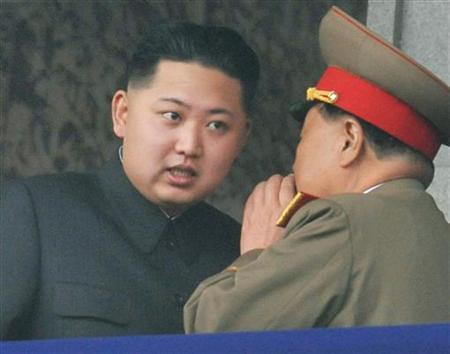
Democratic People's Republic of Korea (DPRK) official Kim Jong-un consults during the commemorations in honor of the 65th anniversary of the formation of the ruling Worker's Party of North Korea. The parade was held on Oct. 10, 2010 in Pyongyang., a photo by Pan-African News Wire File Photos on Flickr.
February 23, 2012
U.S. and North Korea Hold Talks in China
By JANE PERLEZ
New York Times
BEIJING — The first official talks between the United States and North Korea since a youthful new North Korean leader came to power were “serious and substantial,” the senior American negotiator said Thursday, and would extend into a second day.
The talks, described by the Obama administration as exploratory, were seen as a way to test whether the new leader, Kim Jong-un, who is in his late 20s, was prepared to meet conditions that would allow for a resumption of six-nation negotiations that aim to dismantle North Korea’s nuclear arsenal.
The American negotiator, Glyn T. Davies, met his counterpart, Kim Kye-gwan, a veteran North Korean nuclear official, for two sessions on Thursday in Beijing, one at the American Embassy and the other at the North Korean Embassy. The two met for dinner Thursday night, and plan to return to formal talks on Friday, Mr. Davies said.
The issues covered Thursday included nuclear matters and nutritional assistance, Mr. Davies said. He indicated that little progress had been made so far.
The United States, along with South Korea, Japan, Russia and China, has called on North Korea to suspend its nuclear activities as a condition for resuming the six-nation talks. Mr. Davies was believed to be testing the North Korean negotiator on that question.
A former American ambassador to the International Atomic Energy Agency, Mr. Davies was appointed to the North Korean task last fall.
In 2006, North Korea became the eighth nation to have detonated a nuclear device. In 2009, it announced that it had successfully conducted a second nuclear test, defying intensified international warnings. In 2010, a former director of Los Alamos National Laboratories, Siegfried S. Hecker, visited North Korea and was shown an industrial scale uranium enrichment site previously unknown to the West.
Kim Jong-il, who led the North for 17 years, died in December, and now his son Kim Jong-un appears to be consolidating power without the opposition some had anticipated, American officials and regional experts say.
The six-nation talks started in 2003 and have been off again on again ever since. In that time, China has proved to be a useful, though sometimes frustrating intermediary between the United States and North Korea.
As North Korea’s chief benefactor, China has given financial support and has increased trade to prevent a collapse that would result in a flood of refugees at its borders. Beijing has apparently also tried to dampen North Korea’s enthusiasm for more nuclear explosions, American experts say.
In the two years before he died, Kim Jong-il visited China three times. During those visits, a Chinese official with close ties to North Korea said, Beijing pledged to back Kim Jong-un as the next leader on the condition that North Korea would refrain from provocative actions, like a third nuclear detonation.
The Chinese Ministry of Foreign Affairs reiterated its basic public stance on Thursday, saying that peace and stability on the Korean Peninsula was of utmost importance, and urging a resumption of the six-nation talks.
The Chinese appear to have good relations with an important elder figure, Jang Song Thaek, the brother-in-law of Kim Jong-il, who serves as an adviser to the unseasoned Kim Jong-un, said Jonathan D. Pollack, a North Korea expert and a senior fellow at the Brookings Institution.
But over all, China’s interests in North Korea diverge from those of the United States, limiting Beijing’s helpfulness in pushing North Korea to dismantle its nuclear assets, some experts on North Korea say.
The United States would like to see an end to the authoritarian leadership in North Korea, but China believes that such an outcome would result in the reunification of South and North Korea. A unified Korea might then become an American ally on China’s doorstep, Stephanie Kleine-Ahlbrandt, the Northeast Asia director for the International Crisis Group in Beijing, wrote recently.
On a less complex but still tricky issue, the Obama administration has offered nutritional assistance as a humanitarian gesture to the most needy — children, the elderly and nursing mothers — among the North’s impoverished population.
In discussions with the North Koreans shortly before the death of Kim Jong-il in December, Washington offered 240,000 tons of food, including fortified milk and high-energy bars. But the North Koreans demanded 300,000 tons and wanted a large portion of grains in the shipment.
With the North Koreans obstructing efforts to monitor the assistance, American officials say they are opposed to sending grain on the grounds that it can easily be transferred to the North Korean Army, which is the world’s largest on a per capita basis.
No comments:
Post a Comment